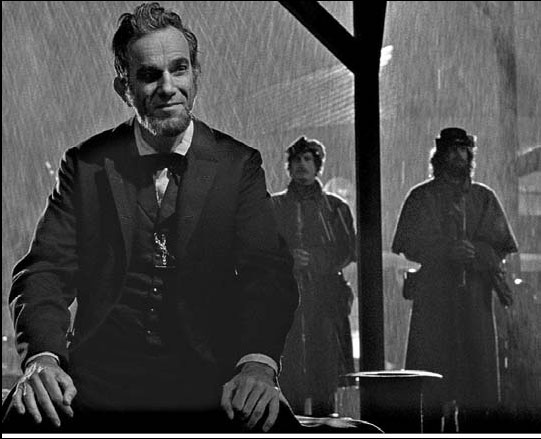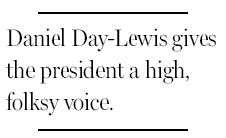Lincoln, the way he really was
Updated: 2012-11-12 09:33
By Charles McGrath (China Daily/Agencies)
|
||||||||
 |
|
Daniel Day-Lewis tried to stay in character during the filming of "Lincoln," even when the cameras were turned off. Dreamworks Pictures |
"Now he belongs to the ages," Edwin Stanton, Abraham Lincoln's secretary of war, said at the president's deathbed.
"And to the studios," he could have added.
The latest in a long parade of screen Abes is Daniel Day-Lewis, who, though he grew up in England and Ireland and had to learn about Lincoln almost from scratch, plays the lead in Steven Spielberg's "Lincoln," which opens November 16 in the United States, and around the world in January and February.
Mr. Day-Lewis, 55, has already won two best actor Oscars, and his performance here, tender and soulful, convincingly weary and stoop-shouldered, will almost certainly earn him a nomination.
Tall and thin, with big hands and a long neck, Mr. Day-Lewis physically resembles Lincoln more nearly than many other actors who have played him. Yet the first time Mr. Day-Lewis opens his mouth in the film, he's also a little startling. His Lincoln speaks not in a stentorian baritone, or in the echoing, ballpark-announcer tones of the Disneyland animatronic Lincoln, but in a voice that is high, earnest and folksy.
Mr. Day-Lewis is fussy about what parts he takes. He is even fussier about what he calls "the work": his process of preparing and then inhabiting a role.
For "The Last of the Mohicans" he taught himself to build a canoe, shoot a flintlock and trap and skin animals. For the opening scene of "My Left Foot," about Christy Brown, an artist with cerebral palsy, he taught himself to put a record on a turntable with his toes; he also insisted on remaining in a wheelchair between takes and being fed by the crew.
He learned to box, naturally, for "The Boxer," in which he played a prizefighter and former member of the Irish Republican Army and in the process broke his nose and damaged his back. To play the gang leader Bill the Butcher in "Gangs of New York," he took butchering lessons, and to play Abraham Lincoln he half-convinced himself that he was Abraham Lincoln.
Mr. Day-Lewis, who has a deep voice and a British accent, not in the least Lincoln-like, prefers not to talk much about his method of acting.
"I recognize all the practical work that needs to be done, the dirty work, which I love: the work in the soil, the rooting around in the hope that you might find a gem. But I need to believe that there is a cohesive mystery that ties all these things together, and I try not to separate them," he said.
The "Lincoln" script, by Tony Kushner, is based on Doris Kearns Goodwin's book "Team of Rivals: The Political Genius of Abraham Lincoln." It covers the last four months of Lincoln's life. That's when he pushed the 13th Amendment, abolishing slavery, through Congress.

Mr. Day-Lewis said he initially thought the idea of playing Lincoln - or of his playing Lincoln, anyway - preposterous. Lincoln, Mr. Day-Lewis said, has "been mythologized almost to the point of dehumanization. But when you begin to approach him, he almost instantly becomes welcoming and accessible, the way he was in life."
Mr. Day-Lewis prepared for the part not by splitting rails or doing sums on the back of a shovel but mostly by reading. He started with Ms. Goodwin's book, pored over Lincoln's own writing and finished up with the Carl Sandburg biography.
All told he spent about a year studying and thinking about Lincoln. There is historical evidence, in the form of contemporary accounts, that Lincoln had a high-pitched voice, and Mr. Day-Lewis has a private theory that higher voices carry better in crowds, and that made Lincoln such an effective orator.
To hold on to Lincoln's voice, Mr. Day-Lewis used it all the time, between takes and even after the filming was over.
Jared Harris (better known as Lane Pryce in the American TV series "Mad Men") plays General Ulysses S. Grant in the movie. He recalled that like other British cast and crew members, he was asked not to throw Mr. Day-Lewis off by speaking in a British accent, so Mr. Harris too stayed in character.
"It was sort of an extended improvisation," he said in a telephone interview. "You didn't go up to him and say, 'Hey, did you see the Pirates game last night?' It was important for him to retain the attitude, if you like, and the dialect he had created. So we would sit there and joke, for example, about the Vicksburg campaign."
Mr. Day-Lewis said that he felt a "great sadness" when the movie was done and that he still feels connected to it. "I'm woefully one-track-minded," he said. "Without sounding unhinged, I know I'm not Abraham Lincoln. I'm aware of that. But the truth is the entire game is about creating an illusion, and for whatever reason, and mad as it may sound, some part of me can allow myself to believe for a period of time without questioning, and that's the trick." He laughed. "Maybe it's a terrible revelation about myself that one does feel able to do that."
The New York Times

 'Taken 2' grabs movie box office crown
'Taken 2' grabs movie box office crown
 Rihanna's 'Diamonds' tops UK pop chart
Rihanna's 'Diamonds' tops UK pop chart
 Fans get look at vintage Rolling Stones
Fans get look at vintage Rolling Stones
 Celebrities attend Power of Women event
Celebrities attend Power of Women event
 Ang Lee breaks 'every rule' to make unlikely new Life of Pi film
Ang Lee breaks 'every rule' to make unlikely new Life of Pi film
 Rihanna almost thrown out of nightclub
Rihanna almost thrown out of nightclub
 'Dark Knight' wins weekend box office
'Dark Knight' wins weekend box office
 'Total Recall' stars gather in Beverly Hills
'Total Recall' stars gather in Beverly Hills
Most Viewed
Editor's Picks

|

|

|

|

|

|
Today's Top News
Health new priority for quake zone
Xi meets US top military officer
Japan's boats driven out of Diaoyu
China mulls online shopping legislation
Bird flu death toll rises to 22
Putin appoints new ambassador to China
Japanese ships blocked from Diaoyu Islands
Inspired by Guan, more Chinese pick up golf
US Weekly

|

|







